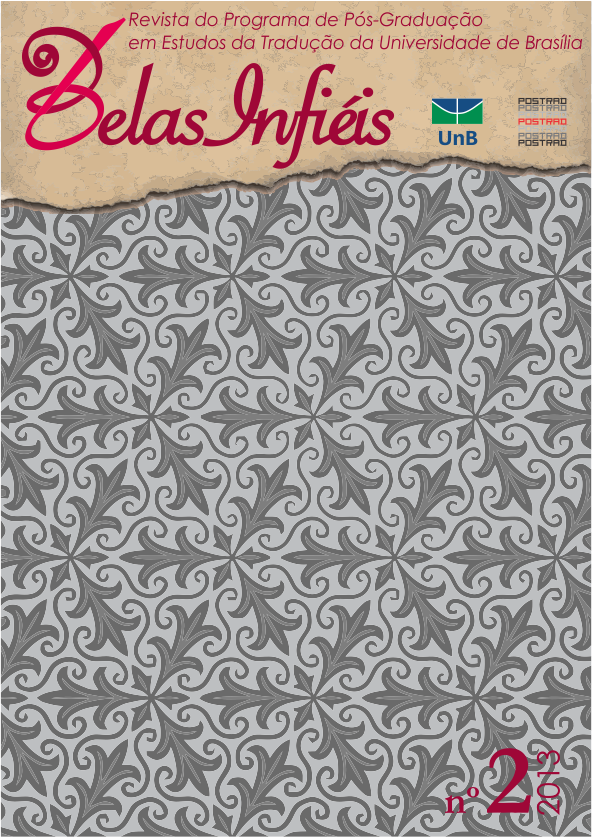A TRADUÇÃO-LOCALIZAÇÃO DE MARCAS
DOI:
https://doi.org/10.26512/belasinfieis.v2.n2.2013.11241Palabras clave:
tradução, localização, novosResumen
A discussão sobre a tradução de marcas ganha atenção no mercado mundial, no qual empresas querem conquistar mercados novos em territórios estrangeiros. Constata-se que a marca é decisiva para a aceitação ou não de produtos por parte de futuros consumidores. Visto que mercados têm diferentes perfis, a obtenção de um efeito equivalente dessa marca tem demonstrado ser possível pela estratégia da localização desse item da embalagem. A localização da marca pode levar em consideração diferentes fatores, visto que grupos distintos em termos de cultura e língua têm demandas e necessidades distintas. Para tal, empresas visam a contratação de profissionais especializados que desenvolvam estudos sobre hábitos e costumes de uma determinada região. Diferentes fatores a serem observados na localização incluem: interesses individuais dos consumidores globais, o grau de tolerância de uma comunidade a línguas estrangeiras, cores da embalagem, a capacidade do consumidor para pronunciar os nomes de marcas estrangeiras, preferências culturais quanto aos tipos de nomes, se soam mais técnicos ou não, por exemplo, entre outros.
Descargas
Citas
AZEVEDO, Laura. A Importância da Marca na indústria alimentar. Disponível em: <http://www.hipersuper.pt/2007/09/07/a-importncia-da-marca-na-indstria-alimentar/>. Acessado em 22 de abril de2011.
BIK-YAN, Chan. Brand Naming-Astudy on brand name translation in China: U.S. brands translated into Chinese and Chinese brands translated into English.Disponível em: <http://libproject.hkbu.edu.hk/trsimage/hp/04013301.pdf>. Acessado em junho de 2011.
BOORMAN, Chris. In: Marketers take a fresh look at the language barrier. Disponível em: <http://www.nytimes.com/2007/07/22/business/worldbusiness/22iht-ad23.1.6765550.html>. Acessado em 27 de maio de 2011.
BORGES, Fernanda. A importância da marca.Disponível em: <http://pt.shvoong.com/humanities/371779-importância-da-marca/#ixzz1KHZx5JBw>. Acessado em 22 de abril de 2011.
BtB. What is localization? ”“Translation Bureau.Disponível em: <http://www.btb.gc.ca/btb.php?lang=eng&cont=213>. Acessado em 04de junho de 2011.
DAYE, Derrick. Brand Packaging: Solving The Mystery Of Shelf Impact.Disponível em: http://www.brandingstrategyinsider.com/branding_and_colors/. Acessado em 27 de maio de 2011.
DePALMA et. al. Can't Read, Won't Buy: Why Language Matters on Global Websites.Disponível em: < http://www.forrester.com/rb/Research/translation_and_localization_of_retail_web_sites/q/id/54629/t/2>. Acessado em 23 de maio de 2011.
HONG, F. C. PECOTICH, Anthony. SHULTZ II, Clifford J. Brand name translation: Language constraints, product attributes, and consumer perceptions in East and Southeast Asia. Disponível em: <http://www.jstor.org/pss/25048888>. Acessado em 3 de junho de 2011.
KAPFERER, Jean-Noël. The new strategic brand management: creating and sustaining brand equity long term.Disponível em: http://books.google.com/books?id=8PoItiB7bicC&pg=PA494&lpg=PA494&dq=brands+according+to+countries+colours&source=bl&ots=ewUe4zsJYC&sig=k32ZqzGPf6IQ_KqEV4jpAO2GjoY&hl=en&ei=fvzfTZaXG4WutweYhJ2OCg&sa=X&oi=book_result&ct=result&resnum=4&ved=0CDAQ6AEwAw#v=snippet&q=colour&f=false. Acessado em: 27 de maio de 2011.
MAILLOT, Jean. A tradução científicae técnica. Trad. Paulo Rónai. São Paulo: Mcgraw-Hill do Brasil; Brasília: Ed. da Universidade, 1975.
Marca deve perder importância na compra de alimentos mostra pesquisa. Disponível em: <http://oglobo.globo.com/economia/mat/2010/05/18/marca-deve-perder-importancia-na-compra-de-alimentos-mostra-pesquisa-916614647.asp>. Acessado em 22 de abril de 2011.
MENSHEIN, Rafael Mauricio. Disponível em: <http://www.portaldomarketing.com.br/Artigos1/Linhas_de_produto_em_Marketing.htm>. Acessado em 23 de abril de 2011.
MONTI, Roberto. A importância da marca. http://www.acessa.com/negocios/arquivo/dicas/2001/10/11-Monti/. Acessado em 23de abril de 2011.
Produtos de higiene e beleza com nome em inglês perde mercado. Disponível em: <http://www.empreendedor.com.br/noticias/produtos-de-higiene-e-beleza-com-nome-em-ingl%C3%AAs-perde-mercado>. Acessado em 23 de abril de 2011.
PYM, Anthony. Localization: On its nature, virtues and dangers.2005. Disponível em: <http://usuaris.tinet.cat/apym/on-line/translation/loclinguistics.pdf>. Acessado em maio-junho de 2011.
SANG, Jian. ZHANG, Grace. Communication across languages and cultures ”“A perspective of brand name translation from English to Chinese. Disponível em: . Acessado em junho de 2011.
WIGDER, Zia Daniell. EVANS, Patti Freeman. CAMUS, Lauriane. MCGOWAN, Brendan. Translation and Localization of Retail Web Sites. Disponível em: < http://www.forrester.com/rb/Research/translation_and_localization_of_retail_web_sites/q/id/54629/t/2>. Acessado em 23 de maio de 2011.
Descargas
Publicado
Cómo citar
Número
Sección
Licencia
Copyright Statement
Given the public access to this journal, the texts are free to use but requires the recognition of the original authorship and initial publication in this journal to be properly stated.
The journal allows the use of works published for non-commercial purposes, including the right to submit the work to publicly accessible databases. Published contributions are the sole and exclusive responsibility of the author(s).
- When submitting papers to be evaluated by the Belas Infiéis journal, the author(s):
- Declare that the contents of the contributions are original and of their original creation, being entirely responsible for their content if there is an objection by third parties.
- Claim to be aware that they should not commit academic plagiarism.
- Declare that the manuscript has not been published, completely or partially, in Portuguese or another language. If it is a translation it should be submitted to the Translated Articles section.
- Declare that the manuscript is not being evaluated by other journals.
- Declare that the manuscript was not submitted to another journal simultaneously.
- Commit(s) to inform the journal of any kind of error or inaccuracy in their contribution (published, in evaluation or in editing) and to collaborate with the editors to make due corrections of the article (when in evaluation or editing) or erratum/retraction (after publication).
- Declare that there is no conflict of interest regarding the published work.
- Authorize its release if it is accepted for publication without any kind of monetary compensation.
- Agree to assign non-exclusive rights to publication to the magazine, remaining free to make their contribution available in other media as long as the publication of the first version in Belas Infiéis magazine is mentioned. They also authorize Belas Infiéis to assign their texts for reproduction in content indexers, virtual libraries and similar platforms.
- Maintain copyright and grant the journal the right of first publication, the work being licensed under theCreative Commons Attribution License.
- Is/Are allowed and encouraged to publish and distribute their work online after the editorial process, which may increase the impact and citation of the published work.
- Authorize the editorial team to make textual adjustments and to adapt the article to the publication rules, when necessary.



















